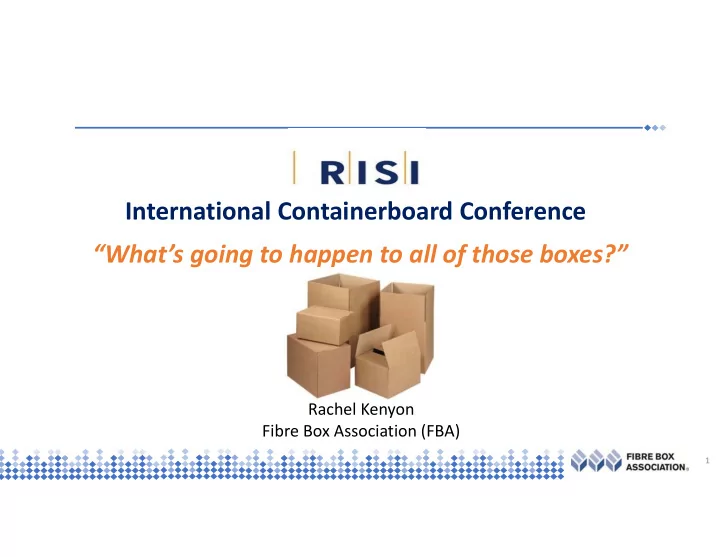

International Containerboard Conference “What’s going to happen to all of those boxes?” Rachel Kenyon Fibre Box Association (FBA) 1
E ver y c ouple of weeks… “Can you give me the data that shows the spike in box shipments due to e ‐ commerce?” 2
Cor r ugated Shipments The Corrugated Industry: Experienced its shipment peak • in 1999 Is still recovering from the • Great Recession of 2008 ‐ 2009 Is growing modestly at 2 ‐ 3% • per year, compared to 15% growth in e ‐ commerce Is adjusting to a delivery • channel shift from commercial to residential Is estimating e ‐ commerce • represents less than 10% of total box use in the U.S. 3
1. Consumer s ar e mor e awar e of pac kaging …Are no longer Boxes going here… going here. 4
2. Box sizes ar e c hanging The supply chain is adjusting to new distribution channels - A case of 4 bottles headed to retail may become a box of two bottles delivered to a home - Many boxes still right ‐ sizing for content fit - Multiple boxes may carry the same amount of goods as a single box in the past 5
Cor r ugated is an E -Commer c e Super her o Humble, yet highly effective…. PROTECTION – corrugated cushions and protects products while absorbing shock from transport DISTRIBUTION – corrugated boxes have a high strength to weight ratio GRAPHIC APPEAL – corrugated boxes can be printed on all six (twelve) sides to help sell products inside SUSTAINABLE – corrugated packaging is both renewably ‐ sourced and has the highest recovery rate of any packaging material 6
What happens to all of those boxes? 7
Histor y of Cor r ugated R ec over y E ffor ts 2017 1970 China National Sword; 1993 1990’s Corrugated Container 2000’s E ‐ commerce calls Corrugated Recycles Educational Corporation Markets for begin Symbol introduced Programming “Chasing Arrows” US OCC expand 1993 1970 Case Studies 2005 The first 54% Boxing Days Amazon introduced Earth Day Curbside Programs Recovery Rate 2005 Repulping & Recycling Protocol Introduced 8
R ec yc ling Cor r ugated Approximately 35 million tons produced • Over 31 million tons of fiber recovered • Positive trend for past 20 years • Hovering near 90% recovery for past seven • years Experienced a drop in 2017 OCC recovery, driven by lower exports of OCC 9
Of the 31 million tons of fiber r ec over ed… 17 million tons were used to make new containerboard in the U.S. 5 million tons were used to make other packaging products in the U.S. 9 million tons were exported, primarily to Asia 10
Cir c ular by Natur e The U.S. corrugated industry is: • A well ‐ balanced system with both virgin and recycled fibers - Virgin fiber from certified forestlands - Recovered fiber • Dependent on a high fiber recovery rate There are more trees today in the U.S. than 100 years ago. U.S. forests absorbs more than 14% of carbon emissions each year. 11
Histor y of Cor r ugated R ec over y E ffor ts 2017 1970 China National Sword; 1993 1990’s Corrugated Container 2000’s E ‐ commerce calls Corrugated Recycles Educational Corporation Markets for begin Symbol introduced Programming “Chasing Arrows” US OCC expand 1993 1970 Case Studies 2005 2018 The first 54% Boxing Days Amazon introduced Consumer Recycling Earth Day Curbside Programs Recovery Rate Research; Industry Working Group formed 2005 Repulping & Recycling Protocol Introduced 12
Industr y Wor king Gr oup Collaborative effort between manufacturers, associations, and waste haulers • Cascades • American Forest &Paper Association • AICC – The Independent Packaging Association • Georgia ‐ Pacific • Ameripen • International Paper • Fibre Box Association • Kruger • Institute of Scrap Recycling Industries • Packaging Corporation of America • The Recycling Partnership • Pratt Industries • RRS • WestRock • Waste Management 13
How Boxes ar e R ec over ed today 95% Recovery Rate 30 ‐ 40% Recovery Rate ? 90% Overall Recovery Rate 15% Residential 85% Commercial What happens if that tr end c hanges? 14
Industr y Wor king Gr oup Use wheeled carts instead of bins Collaborative effort between • manufacturers, associations, and waste haulers Match frequency of recycling and trash collection • Establish clear and harmonized messages and • graphics Use direct “call ‐ to ‐ action” recycling messages on • boxes Educate to encourage recycling behaviors and • reduce contamination Develop better building codes for multi ‐ family • dwellings Promote successful multi ‐ family and rural recovery • programs 15
It’s up to all of us Corrugated Industry – Promote the need for recovered fiber, responsible stewardship and disassembly of boxes Local communities – Promote recycling messages and recovery of corrugated cardboard boxes Commercial – Promote recycling messages on boxes and advertisements 16
17
A used corrugated cardboard box is not WASTE, but rather a valuable RESOURCE waiting to be reused 18
T ha nk Yo u 19
Recommend
More recommend